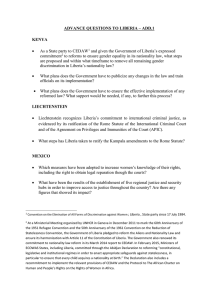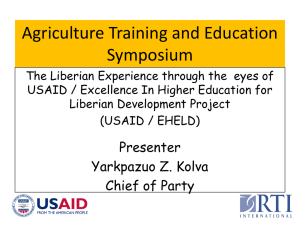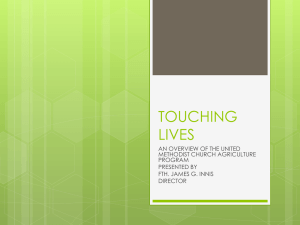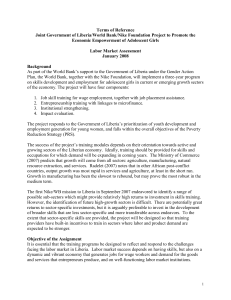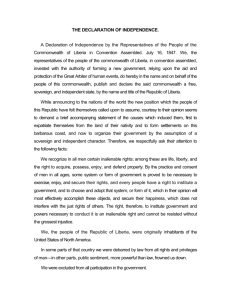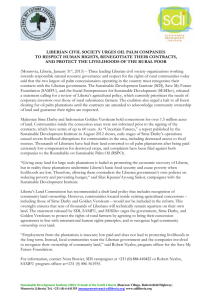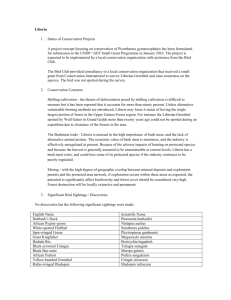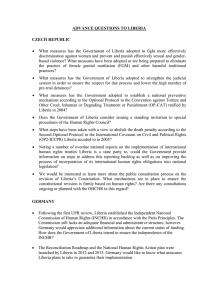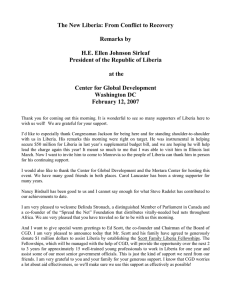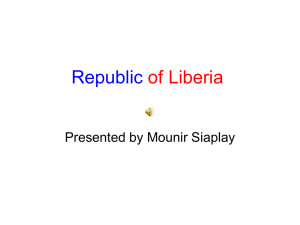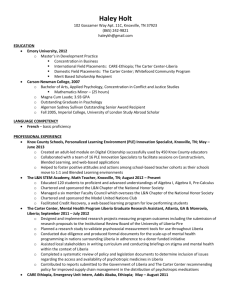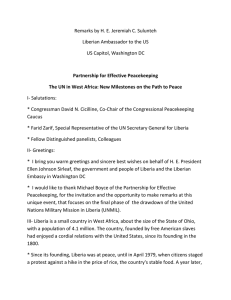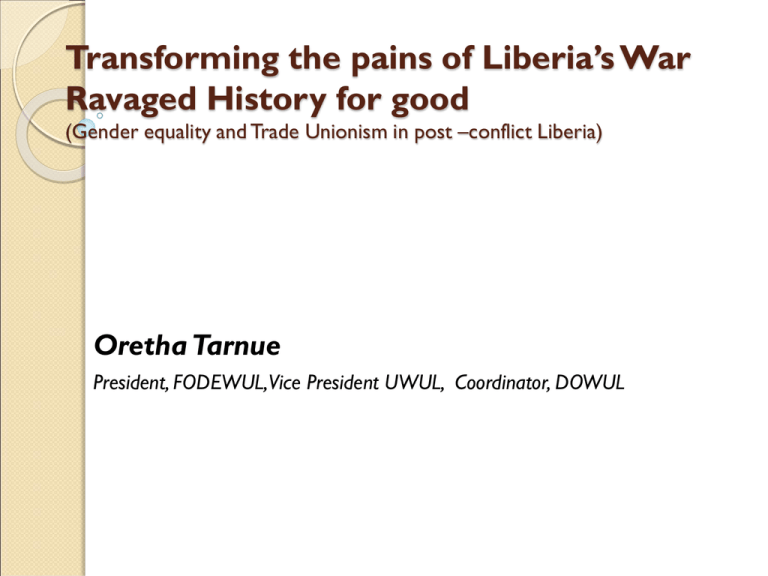
Transforming the pains of Liberia’s War
Ravaged History for good
(Gender equality and Trade Unionism in post –conflict Liberia)
Oretha Tarnue
President, FODEWUL,Vice President UWUL, Coordinator, DOWUL
Presentation Outline
•
Getting to Know Oretha!
•
Basic Information on Liberia
•
Gender equity & Trade Union
before/during/after 14year civil War
•
Rebuilding our unions –finding a place for our
women (Strategies).
Getting to Know Oretha!
•
Joined Forestry Union in 2002.
•
Contested for presidency position in local union (Forestry
Workers’ Union), in 2002 and won.
•
Presently the vice President of Liberia’s fastest growing
union -United Workers Union of Liberia.
•
A former domestic worker in Liberia
•
Backbone of Domestic Workers Union and their fight
for better working conditions
Where is Liberia
Located in West Africa with a population of 3,999,000.
• Rich in natural resources.
• One of the world’s poorest
• countries
•
•
Suffered two civil wars:
• 1989 to 1996 (1st civil war ended in
• 1997 with Charles Taylor as president)
• 1999 to 2003 (2nd war ended with exile of Charles Taylor and election of first
female President, Ellen Sirleaf Johnson)
•
The two back to back civil wars left half a million people dead
Gender equality and Trade Unions before the
War.
•
Before the Civil War, TU’s activities were without
substance.
•
Trade unions were organized on industrial lines
•
No political will on government’s part to
engender tripartism.
•
Participation by women was insignificant and
burdened with cultural & traditional
stereotypes.
Liberian women and the 14 year
war
Women and children were most affected.
Physical abuse:
rape, sex slaves, sexual humiliation & mutilation
Maimed (loss of limbs, blinded, infected with STDs, HIV
& AIDS)
Malnutrition
Neurological, Psychological & mental disorders
Drugged up child soldiers.
Depression, suicidal behavior & sleep disorders
Effect of the war on women
•
Effect was three-fold:
• Anger:
Women mainstreamed into male-dominated careers for self
protection (female soldiers).
• “Necessity Empowerment:
Women organized into various women groups to carry out peace
initiatives ( eg. Leymah Gbowee WIPNET initiative)
• Boost of confidence:
Under war conditions, women were more likely to be abused than
killed so we took on roles as breadwinners in very degrading,
dangerous and threatening conditions by breaking the storm and
finding food and water for our male partners hiding themselves under
our cover from the killing spree of the rebels.
• These factors acted as turning points for women participation in
trade unionism after the war
Trade Unionism in Post-War Liberia
•
A lot of confusion - Fragmented unions with weak
structures.
•
Inter-union disputes on jurisdiction.
•
Unequal scramble for jobs in a recovering economy.
•
Unbalanced struggle for women empowerment within
trade unions.
•
Precarious situations of the war was a good leverage for
more active involvement of women in post war Liberia
Strategies
•
advocacy on policy/ legislative issues
•
Door to door recruitment of women into unions.
•
Mainstreaming women into male dominated careers/jobs.
•
Encouraging women to actively participate in union activities.
•
Trainings & education on leadership/organizing skills.
•
Mentoring promising female trade unionists.
•
Building a network of male ‘gender friendly’ allies
Impact
•
Policy & Legislative advocacy
– LLC & UWUL engaging government on DWB (inclusion of informal
economy workers)
– Inclusion of affirmative clause in DWB
– UWUL women leading the fight against worst worker rights abuses in
Liberia.
Door to Door Recruitment:
– Organizing domestic workers
• 1840 domestic workers recruited
• Union registered
• Trained zonal coordinators to
facilitate meetings
• Mobilize around members
in difficult times
• Supporting union to build an office
& develop a model contract of
employment
SC and USW training for domestic workers
Impact
(Agricultural Sector)
•
Mainstreaming women into Male dominated careers:
– Main source of foreign revenue for government= rubber
– Firestone Plantation = 1 million acres.
•
•
•
•
•
total workers 7,938
Female workers 869
union members 4,943 (union estimate)
Female workers union member = 404
Work covered b4 the war by women =administration, health.
• Post War: working the rubber nurseries, bud grafting trees for quality yields,
planting, laying out the landscape and planting rubber trees, carrying out pruning,
applying chemicals and nurturing rubber trees until ready for harvest.
• No of women in Rubber Nursery work = 404 (B4 the war = 0)
FAWUL…rubber plantation workers (Nursery
section)
Impact
•
Gender & leadership education:
• Has worked wonders in empowering women.
• Gained space for female unionist on CB negotiating tables (eg.
ArcerloMittal, Firestone CBAs)
•
Gender equality campaigns:
– UWUL supported mass action within Forestry sector.
– Staff strength = 418
– No of women = 62
• As at 2004 = only 6 women in senior positions.
• 2013 = 17 women in senior position
• Gender desk officers to oversee gender issues
Challenges
Liberian Constitution and statutory laws which is
characterized by so many gender neutral terms.
Cultural stereotypes/ prevalent discrimination against
women
Issues with nursing mothers on plantations
Balancing tasks associated with skilled work and family
responsibilities.
Inadequate support from male unionists for women
running for elective offices.
Funding for education/awareness programs on gender
equality
Rebuilding from the ashes!!!
…
Kazuo Duo

